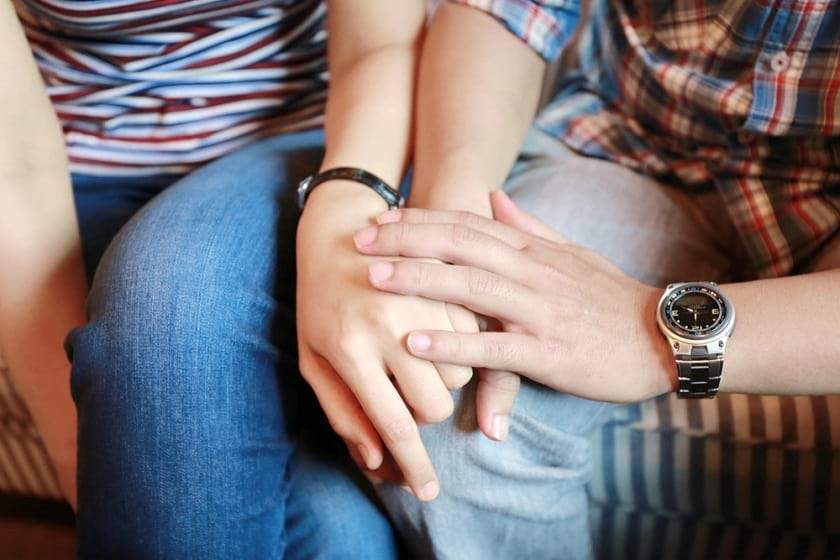by Blanka Csanicz
Reviewed by Cara McCarter
With minor adaptations with regard to ancillary support services and their contact details which are not relevant for the local South African market.
One of the most difficult things about a cancer diagnosis is telling your family. This post contains practical tips for approaching these conversations…
by Hilly Janes
In the past the “c word” was spoken about in hushed tones, if it was mentioned at all. But thanks to medical progress, we understand that cancer is not necessarily a death sentence – survival rates for many types have improved dramatically. And times have changed too, so talking openly about cancer is no longer taboo.
And there is so much to talk about when someone receives a cancer diagnosis. It can trigger a cascade of emotions from shock and anxiety to anger and fear, or even numbness. Plans will be up in the air and while you will become the centre of attention, family members may also experience these feelings. Bottling them up won’t make them go away, while letting them out can reassure and relax everyone.
There is no right or wrong way to talk about cancer and these days families come in all shapes and sizes, but you know your family better than anyone. As well as having cancer, you have a new role – choosing how to keep them informed.
Where to start?
If you hear your diagnosis alone, the first person to tell is your partner, closest family member or friend. Make sure you have the facts straight in your head – keeping notes at consultations helps with this. Choose a calm moment and quiet place when you can be alone together and prepare yourself for their reaction. They may be very upset, while you might be thinking ‘Whaaat? Want to try swapping places with me?’ You will need their support however, so try and keep the lines of communication open.
Talking to children
If you have adult children with partners, break the news when they are together – it will save your sons or daughters having to pass on the news, and they will be able to support each other. If they have children of their own, ask them to explain about granny or grandpa.
Adolescents and teenagers
This age group often know more than they let on and won’t thank you for pretending nothing is wrong. They may just want to hear the facts and seek reassurance. Don’t be surprised if they don’t want to talk about it, even if you want to, or if they need to let their hair down more than usual. You may want to tell them before younger siblings or tell your children all at the same time. Boys may find it easier to hear news about mum from their dad or a trusted male relative.
Young children
Try to use simple language they will understand, perhaps explaining that you have some lumps and bumps that need to be taken out, but that these aren’t catching and it’s not their fault. Very young children won’t understand, just try and keep their usual routine going.
Talking to your parents
Telling your own mum and dad that you have cancer will be especially hard. They will want to make everything alright for you as they did when you were a child, but they can’t. Accepting some TLC at the family home may help you all – what one woman with cancer describes as ‘Hotel Parents’.
Extended family: keep some distance
It may be easier to tell extended family members through a group email to conserve your energy, and if you can’t face it yourself, ask your partner or someone close to take this on and manage replies. You can keep everyone updated easily this way, or once they know, you could set up a private WhatsApp or Facebook group. Not sure how to do this? Ask a teenager!
During Treatment: Asking for help
Cancer treatment can leave you feeling unwell, exhausted and depressed. Your loved ones can only watch this happen. ‘What can I do to help?’ will be a common reaction. Explain that you just don’t have the energy to do everything you used to. If you have ‘chemo brain’ and are getting forgetful, ask for help with making shopping lists or reminders. Think of this as a win-win situation. You are getting help and your nearest and dearest will feel less helpless.
Saying ‘the wrong thing’
Family members may not be able to deal with bad news and be relentlessly upbeat, trying to shut you down or not tell you things that they think might upset you, when you would rather they had been honest. Remember they may be nursing you one week, or waving you off to work the next – that’s challenging.
Physical changes caused by treatments can really lower your self-confidence. If your partner saying you still look great makes you want to thump them, that’s normal! It can take a year to recover from treatment, so be kind to yourself
Getting outside support
If talking to family members is unbearable – or vice versa – consider talking to someone else. You should have access to a navigator, and there are many support groups and helplines.
SOURCE: https://cancer.livebetterwith.com/blogs/cancer/how-to-talk-to-your-family-about-your-cancer-diagnosis

